If you could kindly tap the ❤️ at the top or bottom of this newsletter it will make it easier for other people to find this publication. Ahéhee'! བཀའ་དྲིན་ཆེ།! 謝謝! Thank you! ขอบคุณ!شكرا ! תודה! Спасибо! धन्यवाद! Cảm ơn bạn! អរគុណ! Ngā mihi nui ki a koe! Asante! Merci y Muchisimas gracias!
“Green Ganga” painting by John Bukaty
This week marks my two year anniversary here on Substack. It has been quite a journey so far. It all started when I was in the gardens planting seeds alongside a pleasant volunteer at our farm, a young woman from Canada. Although we receive hundreds of volunteers each year, it isn’t all that often that I meet someone who truly holds similar ideas as do I and well, she did! Although I do love living in Thailand, I am not Thai and as such my worldview, which was already rather strange in the minds of most of my countrymen back when I lived in the land of my birth, is most certainly considered bizarre by most of my peers here. Needless to say, I was elated when it was suddenly easy for me to swiftly delve into the murky waters of topics near and dear to my heart, the tricky kind that cleverly yarn between post-activism, noble grief, the longing for home, the spirituality of compost, right-relation, intergenerational healing, cultural cross-pollination, ritual farming and the like. Being understood is such a precious gift.
One day, again with our hands in the soil my new friend was sharing a story with me that was so similar to something I had that morning read that I couldn’t help but mention the article (which incidentally was a piece written on Substack, for A Growing Culture) to her. As it turned out, she was the author! I couldn’t believe it! What a small, magical world! At the time I had no idea what Substack was. And I can’t now recall how I came across her writings to begin with but somehow along the line I evidently must have clicked on a “subscribe” button that surfaced through the mysterious ethers of the algorithm as I had been receiving her well-written offerings regularly with delight.
That whole serendipitous event seemed special enough to me then that I shared with her that I too was a writer, albeit a closet writer who rarely shared my writings with anyone but my inner critic. She encouraged me to start doing so and for reasons unbeknownst to me, I obliged! And with thus, the birthing of Hiraeth, this little ongoing meditation on post-modernities meandering search for Home. (Our farm volunteer/author by the way was/is the incredible Thea Walmsley who I highly recommend following. She hosts a Substack entitled Down to Earth that is filled with precisely the kind of earth-based wisdom so desperately needed now.)
Throughout these past two years I have become quite familiar with the curious feelings that arise with what some refer to as a “vulnerability hangover”. Regularly sharing about ones intimate experiences is not for the faint of heart and as I trudge along with you all, trying to grow my capacity for doing so, I must tip my hat to all the writers out there, such as Thea, who have been modeling for me just how to do so, with skill, artistry and grace. You inspire me in countless ways.
I am honored to share that I am quickly approaching a readership of over 1,000 good-hearted kin. Now I realize that there are more people out there, like Thea, who also yearn for a world more aligned with myth, magic and mystery, one just over the horizon, beyond concepts of right and wrong. In fact, there are many of us.
It is good to be here with you. Thank you for showing up, for giving me a place to share. As my beloved mentor, Martin Prechtel often says, without people to listen, there can be no echo. I would be but privately journaling away if not for your hearts’ generous willingness to receive what I attempt here to share.
An extra special thanks to those courageous readers who regularly chime in in the comment section and keep our dialogues rich. For without active communication, relations atrophy and isolation reigns supreme. Much gratitude to you all for fanning the flames of community.
In honor of this being the two-year anniversary of my first post (a post that has since turned into a full book that, gods willing, will one day see the light of day!) I am reposting that foundational story here for all to read. For, as it was my first post, back when I dare say I only had but 5 or so readers, the overwhelming majority of you have not yet read that precious initiatory post of which this entire offering was built upon.
Please enjoy.
And again, thank you.
Scottie had just woken up. He had risen with the roosters well before the sun had returned and was allowing the new day to slowly sink in. He had wandered away from his in-laws’ home and was now leaning against a coconut tree that to him appeared a bit out of place, the single pillar of life standing tall amidst a frighteningly dry, soon-to-be cornfield that had, until recently, been filled with some of the largest mango trees in all of Southeast Asia. At least that’s what his wife had told him, whose mother had given birth to her all by herself under one of those very trees nearly 40 years prior. And who was he to doubt her? Either way, that once fertile land had since been grossly mismanaged, overused, and saturated with far too many agrochemicals. Little remained now in that little squarish field along the Nan River that could actual be considered soil suitable for growing anything at all. That anything was still able to grow in this oddly shaped dust bowl was a testament only to the peculiar genius of technology. Right here on the outskirts of the Golden Triangle, it was beginning to look a lot like where he had been born, in the middle of the American heartland, where once he ran through seemingly endless cornfields with his childhood playmates imagining they were in a faraway world of dense tropical rainforests abundant with wild, raging rivers, fearless tigers and stampeding elephants.
He drifted slowly in and out of various dream-like pre-coffee ponderings and was about to head back to the house to heed the call of a rising headache demanding he honor his bodies need for caffeine when his cellphone began to ring. It was his oldest, dearest friend from his former life, Kevin, calling from his beloved former mountain home, Crested Butte, Colorado.
“Scottie? Can you hear me? Is the connection, ok?” It frequently wasn’t. As such, calls from home carried with them a sort of reverence and required an acute attentiveness, for they might not last long and would likely not come again for quite a while.
For over a decade, dispatches from the old shire had taken on a familiar tone, one that suggested an unwanted disruption to the way things once were, signaling a discomfort regarding the new face of their cherished, once secret paradise. Wealthy second homeowners had been buying up vacancies in and around town for years, but with the Corona Virus pandemic now in full force an increased rapidness to the disputed changes could be felt. Kevin, with whom Scottie had spent the best days of his formative years freely exploring the peaks and valleys of the West Elk Mountains surrounding town, owned a small restaurant there that had served as the main gathering place for locals for nearly a quarter century. His restaurant was a kind of Norman Rockwell meets Hunter S. Thompson mashup where one always found a friend and never felt pressured to buy anything in order to join them. If you were hungry, you would be fed, regardless of whether you had money to pay or not. In those days everyone knew everyone and put faith in an unspoken code of reciprocal generosity, confident that when the tables inevitably turned and you were down and out, you’d be taken care of too. But as Kevin shared more regarding the recent influx of outsiders who, fearful now of living in cities and wealthy enough to live anywhere they pleased, it was clear those days were now but fodder for nostalgia. The town was being bought up and sold out. Few true locals could afford a place to live in anymore. As such, Kevin had only enough employees to remain open three days a week. Come winter, he estimated, he would be forced to close shop.
“I miss you Kev.” Scottie said, with an almost fatalistic sincerity. “I miss those snow-covered peaks. There’s nothing like that here.”
“Well,” Kevin said, “Those mountains are still here, as incredible as ever. They haven’t betrayed us. I miss you too.”
They spoke a bit more, catching up on local gossip and the awkward elegance of aging, shared some laughs, meandering tales of their new lives and how they were rooted in their old ones and finally, they shared goodbyes; Kevin from under a fantastic star-filled sky and Scottie, from under a scorching sun that should have been covered by rain-granting monsoon clouds but was instead expressing an eerie unpredictability.
The difficult, curious feeling of speaking through a cellphone, feeling so familiar for a few haunting moments only to abruptly return to an environment of stark contrast which had somehow managed to become a new home regardless of not offering the same grand comfort Colorado once had, never seemed to dissipate. Sometimes he wondered if he had made the right choices. He longed for that familiarity, for the crisp air of the Rocky Mountains, for bluegrass music, friends who spoke English and enjoyed drinking coffee. He missed forests where he didn’t need to constantly be alert for king cobras, scorpions and wild boars. He missed the simplicity of dogwoods, silver sagebrush and the all-seeing aspens. Most of all, he longed for the carefree people of that once thriving mountain community he had known to live within at what seemed to be the edge of the world, whose colorful memories still frequently kept him awake at night, thus causing an unwarranted sadness to fill his Thai wife’s heart for fear that her beloved wasn’t happy with his new commitments. Yet he knew Kevin was right. That magical little mountain shire he had once held so dear was essentially no longer there.
He took a deep breath and waltzed into the steamy morning atmosphere that was a bit less foreign to him now than it had been when he had first arrived a decade earlier. Returning to his present surroundings, subconsciously making the cultural and linguistic adjustments required, he approached the little, old bamboo hut where his wife’s family kindly awaited him, offering an impressive spread of sticky rice, freshly caught fish, forest vegetables and nam-prik.
“Gin Kao!” they all said as they laughed and grinned in the contented way only a people who have never traveled further than twenty miles from their place of birth truly can.
Scottie placed his hands together in the prayer-like manner that politely signifies respect throughout Thailand, bowed gently and offered a smile. Kneeling, he proceeded to sit cross-legged beside his wife, Ramphai, who was breastfeeding their newly born daughter, Hanna.
Hanna had been born at the crux of the ongoing global lockdown that had resulted from the rapid spread of a novel corona virus whose origin was generally believed to have sprung from a wild bat illegally sold at a wet market in nearby China. Thailand, though likely the most vulnerable country of all regarding the virus’ spread had early on managed to quickly organize itself and prevent a major outbreak. As such, for a brief time, they had become the envy of the world. While much of the global population had been banished to their rooms for what appeared to many to be a blatant violation of some long-forgotten agreements with the Wild Earth Herself, Hanna came into this world peacefully. Amid international paranoia, she miraculously sprouted into being with relative ease in an underfunded, nearly empty, understaffed government hospital whose new-school policies, borrowed from the west, would have preferred to have had mom simply drugged up and sliced open as opposed to the old fashioned mother-tigress-roaring-from-under-a-forest-of-ancient-mango-trees approach grandma had inherited from her mother before her and hers before her and on since well before the age of convenience awkwardly dawned like a hungover backpacker on the shores of Ko Phangan. But Ramphai was indeed her mother’s daughter. Nearly alone, on a big, cold, overly sterile stainless-steel slab of arrogant modernity, she bravely gave birth to a strong and beautiful, baby girl. A life-giving, coconut tree rising gloriously before an over-tilled, genetically modified cornfield.
It was now June, of 2021. The Covid-19 pandemic that had before briefly managed to bypass Thailand had suddenly opted to make itself known. Resulting from some rather kinky engagements initiated by a handful of Bangkok’s elite, the kingdom was suddenly scrambling to avert what till now it had but witnessed from afar. Scottie, who was a professor, due to the pandemic, had been out of work for over a year. Although it had appeared as though the situation was improving, this new wave of the virus’ spread was proving to be far more deadly than any previous. Yet he remained calm.
The lessons of 2020 had seemed to crystalize many of the transformations that had already been underway for years. The shocking revelations of that tumultuous year had an exceptionally effective impact on him, as a new father, as an expat coming to terms with the crimes of his forefathers, and as a man approaching 40 who had managed to extend adolescence way further than would have been appropriate at any other time in history. The previous year’s incessant waves of reckoning had sent him full circle from anger and utter confusion tinged with brief moments of clarity, back to even deeper, soul complicating grief that violently ripped the carpet of privilege from under his well-manicured feet and found him stumbling into what could only be understood to be love.
The world had slipped into a disorienting spiral of revelation whose weight and implications appeared impenetrable. It was clear to him his approach to “work”, should it again return in any way that resembled the life of a “teacher”, would be radically different than it had been before. Yet, though the curious seasons of which his young family had recently managed to pass through felt akin to being fired through an apocalyptic portal, everything now somehow seemed less urgent, and oddly more possible. Though frequently melancholic due to the perpetual dying off of so much beauty, Scottie remained filled with wonder, possessing a joyful confidence he knew was not his alone.
For the entirety of lockdown, Scottie and his new family had remained in his wife’s childhood village, nestled along the Nan River not far from the Laos border. Though the pressures of modernity had certainly not escaped their jungle hamlet, his wife’s mother, khun mae, still managed to live as she always had, rising before dawn each day to venture into the surrounding forests to harvest wild foods, collect various kinds of wild cottons and fibrous woods for making necessary items for functional use in daily life, making ritual offerings to local spirits, planting rice, planting corn, harvesting tobacco, gathering fruits, etc. Money was seldom used. Although much of the landscape had changed in recent years due to relentless outside pressures to convert to a lifestyle based on monetary gain, the forest still managed to offer everything truly needed. And although her children had all moved away and spent much of their lives earning money to do what all good Thai Buddhist children must; return their parents love by buying them fancy modern things like cars and phones and even big houses (all of which Ramphai and her siblings did in fact do), the big house she now owned nonetheless usually sat empty, and the fancy car was seldom used. Though she did like to listen to the local “lukthung” radio show on her cellphone, she rarely used it for anything else. Her days were spent just as Ramphai remembered they had been when she was a child growing up alongside her mother, between the forest, the rice field and the tiny bamboo shack that still stood adjacent the western style house her children built her, where they were now lazily enjoying breakfast together.
“How is Kevin?” Ramphai asked, handing Scottie a slice of durian, arguably the most controversial of all foods. Scottie took a fiery bite of that foul smelling, custard-like fruit he never even knew existed until he met his wife and felt oddly conflicted over how to respond. Struggling to find words to paint a picture that could properly explain gentrification and the historical irony unfolding in the place he had once called home, he simply said, “Kevin is doing well. It was so nice to hear his voice again. He sends his love.”
Scottie had been an educator for nearly 20 years, though rarely in any conventional since. Shortly after graduating from university, he began teaching American teenagers how to rock climb, mountain bike and snowboard. Eventually this led to more immersive excursions throughout remote areas of Colorado and Utah where he taught basic wilderness skills like how to treat water, how to make a fire, how to avoid getting attacked by a bear and what to do if one couldn’t. For a stint he taught “cultural studies” at the local high school, which was what he had got his degree in. This did not last long however as even in Crested Butte, a rather liberal community to be sure, the bureaucracy of the public school system left him jaded and uninspired, so much so that he nearly veered from teaching altogether to pursue the life of a full-time ski bum.
In those early years, between random stints as a free-lance educator he lived in the back of his rusty old ’85 Chevy truck, surviving on but a meager income attained from money saved from teaching supplemented by washing dishes and occasionally selling weed. He had no problem with this lifestyle and in many ways, it was his preferred lifestyle. There was a peace found in the simplicity of it all that he had not found anywhere else. He especially liked washing dishes. Then one day, as fate would allow, while washing clothes at a public laundromat he happened across a curious pair; a Buddhist monk from Vermont and a woman who was vacationing home from China where she had been serving with the Peace Corps. They struck up a conversation about a book Scottie had noticed the monk was reading. In no time at all one interesting story segued into another and by the time the clothes were cleaned and folded, a friendship was brewing.
Although the monks account of how he decided to abandon the world and become an ordained follower of the Tathagata was indeed intriguing, it was the young woman, Angelica, whose tale would soon alter the course of Scottie’s life. As it turned out she too, for a time, had wanted to be a Buddhist nun, which was why she had opted to join the Peace Corps, as an opportunity to prepare for such a life by learning an Asian language and traveling to a Buddhist country. She wound up teaching English in the borderlands between Sichuan, China and what is now referred to by the Chinese government as the “Tibetan Autonomous Region (TAR).” She was an incredible young woman with a story that instantly enthralled Scottie. Born in the suburbs of Denver to a typical all-American, white-bred, god-fearing, middle-class family she now lived with a family of nomads from Kham, in Eastern Tibet. Scottie realized the monk and Angelica were not involved romantically when he learned that Angelica would soon be returning to the TAR to marry Tinzen, the son of the woman she had been living with for the previous two years. Upon return to Sichuan she would be leaving the school she had been teaching at and moving to the grasslands where her fiancés family lived as yak herders. Clearly, her monastic pursuits had shifted course, but the pursuit of such a life had prepared her for a similar life dedicated to the quest of knowledge. Already fluent in Chinese, Angelica was quickly learning to speak Tibetan as well. And to top it all off, she was pregnant with Tinzens child.
Scottie, also born into a typical white-bred, evangelical god-fearing family, interested in Buddhism and desperately craving adventure beyond the well-insured, foam-padded playground that was the USA, felt an instant kinship with Angelica. What would certainly have been viewed as a bizarre story to many seemed to him to make perfect since. He felt as though he could relate in some way to her experience, felt compelled to follow in her footsteps somehow and as such, having recently quit his job, been dumped by his girlfriend due to his lack of any desire to move out of his truck or “get a real job”, and essentially having very little reason whatsoever to stay where he was, he wondered if he might also be able to go to China, to fill in the soon-to-be vacant English teacher position at the school where Angelica had taught after she left for her new grasslands home. To his great joy, when asked, she said it was in fact possible and that if he was able, he could start working by summers end. And with that, Scotties unlearning began.
“Untied States” painting by John Bukaty
…
What followed was a meandering multi-decade, multi-continent career as a wandering “teacher” whom, in hindsight Scottie wasn’t so much the one doing the teaching as was he himself being taught by the many places and people who had been, in his latter-day opinion, wrongfully duped into viewing him and where he came from as possessing a superior way of living. The ensuing years would devastate him, horrify him, enchant, re-educate and initiate him and would ultimately snap him out of his well-intended yet nonetheless arrogant efforts to “make peace on earth”. He would be humbled and eventually abandon whatever plans for so-called “success” he had once held in exchange for the far more useful act of becoming an anonymous, genuinely participating human, deeply in love with the oddly overlooked act of simply living a meaningful life. The goals and dreams of the culture he spawned from would eventually seem not only silly and undesirable but immature and enormously dangerous.
For half his life Scottie had been parading around the world as an educational hit man of sorts, sent forth into the world by the same forces that had been assimilating the world for centuries, to spread the good word of the English language, of modern thinking, of flushable toilets, of efficiency, democracy, high speed Wi-Fi, paved roads, industrialized agriculture, Kentucky Fried Chicken, ball caps, t-shirts, Gore-Tex, handheld computers and oversized headphones. Now here he was years later married with a baby living through the myriad events of the Great Post-Truth Lockdown which demanded he relearn all the forgotten parts of history that lay beneath such seemingly innocent items, good intentions and honorable actions which his schooling and the style of schooling he himself had promoted for years, had conveniently left out. Furthermore, his increasing awareness that, were he black, indigenous, female, trans or adorning any body of culture other than his own standard size 32 white male, made-in-America body, the oddly effortless adventure that had afforded him countless meaningful experiences, of which he was certainly grateful for, would likely have never occurred. These recognitions were now all-consuming and cast a shadow over everything he did, saw, heard, and dreamed. They pertained to why his Colorado home was now experiencing the same ill fate the Ute people had experienced a century before, why in his wife’s village the land was beginning to lose its ability to feed its people, and ultimately it spoke to how the people themselves, in his in-law’s village as well as elsewhere around the world, were losing their ability to, in turn, feed The Land.
Later that morning, after breakfast had been eaten and the daily post-feasting ritual of lying around the sala for a nap had commenced, Scottie lay lazily in the hammock that he had himself woven after learning how to do so earlier that year from Khun Mae. As his in-laws snored, he stared into the hot blue sky and reflected over how he had come to be where he was. With his belly full and lovingly blanketed by the peaceful acceptance of his new family, he mourned inwardly the loss of the town where he had once lived while simultaneously basking in the rather peculiar feeling of connection he felt to where he currently was on the other side of the world. Then his phone buzzed. A notification read that 751 bodies had been discovered at a former catholic boarding school for indigenous children in Canada. His heart sank. And something deep within him began to spark.
The ghastly ugliness of 2020 had at this point become the new normal, with daily reports of mass species extinction, mass shootings, climate catastrophe, war and rumors of war spewing soundbites declaring inevitable impending doom scrolling through his newsfeed so frequently that a protective layer of numbness had grown around Scotties psyche that no longer allowed for much reaction to any of it. Yet with this news, something very real and tender was touched. Something akin to a memory. And he wept.
He lay there, tears falling down his long unshaven face, as a new father, as a white-bodied American man married to a brown-bodied Thai/Laos woman whose family had literally fled bombs dropped by his people’s government on their homes only decades before. He looked around him and saw his new family peacefully sleeping, nestled safely within the eye of a raging cultural storm. The hot blue sky turned violent and from within its magma-like pool he could hear faint yet clear intergenerational whispers being sung by a choir of countless infant ghosts singing in a thousand different languages, “Do not forget us...”
His crying woke his wife. She gently lay their baby down and approached her husband. “What’s the matter?” she asked. “Well,” he said, bringing her softly to his side, “I just received another important message from home.” He held her close and told her he loved her.
The sky was at peace again. They snuggled and stared into the dusty field surrounding that lone coconut tree, poetic justice stretching out before them in various shades of riddle. The peculiar definition of progress as defined by the western world and the educational platform it distastefully had crammed down everyone’s throats for centuries through various incarnations of residential schools that now took on the form of “development projects” made its presence known even here in the middle of seeming nowhere. It was all there, hidden in the very reasons for why this soon-to-be cornfield was so barren. Countless forgotten trees, flowers, animals and bugs all buried before them under scorched earth drowned out by the very chemicals sprayed over Southeast Asia years earlier by the U.S. government as a weapon of war. All in the name of modernity’s peculiar definitions of “civilization” and “freedom”.
All those years ago, when Scottie had signed on to teach English in China, he was naively being recruited by the very system he was convinced he was escaping. A descendant worldview of the underlying philosophy that had empowered the catholic church to re-educate and/or massacre countless children in order to “kill the Indian and save the man”, had subconsciously convinced him to be a messenger of a similar ideology. Just as so many other good-hearted Peace Corps volunteers, aid workers, and volunteers of all kinds, he had been weaseled into tramping about the world grasping a U.S. Passport to unknowingly participate in the rapid assimilation of many of the most unique peoples on Earth. Under the banner of “service and education”, adorned with a white body and a bright smile, woefully unaware of the implications this residual symbology carried with it, he unwittingly participated in the dismantling of many of the most important educations the world had ever known, educations that, unlike the profit driven, land grabbing, technologically focused kind that force kids to all wear the same clothes, speak the same language and spend childhood in a classroom instead of by the water’s edge under the Tree of Life, taught what he was only now getting a true glimpse of; the importance of Place, the beauty and necessity of diversity and responsibility to a time beyond now.
2020 had begun revealing many of the darkest shadows of history in such potent ways that any avoidance of them was impossible, regardless how numb and overwhelmed one had become. And along with the pandemic had come the rise of some of the most blatant white supremesist leaders the world had seen in decades, and with them, their faithful servants. Countering their vile tendencies however came too wave after wave of the most vocal and well-organized resistances in modern history, if ever. From all directions of the globe, joining in harmony with the hauntingly beautiful song Scottie had heard coming through the hot blue sky was a battle hymn of remembrance ushering in an inevitable time of reckoning. It was a song that had been sung for many years, for many lifetimes. Scottie knew he knew the song too, though the words had been forgotten, drowned out by an overbearing chorus of bigger, better, faster, more incessantly grinding over a maddening pop radio pulse now so dominant. Yet this more refined groove was returning and no matter what role he had unwittingly played previously in assisting the silencing of its ancient song, he vowed to relearn the changes, to memorize and metabolize every heartbreaking verse and to one day pass on this song of songs to his daughter.
Although he didn’t realize it going into it, lockdown was for Scottie a crash course in how to be human. It was the first truly useful schooling he ever received. It was like an advanced placement course in unschooling for adults recovering from westernized education. Far from modernity’s maddening distractions, isolated with his wife’s family in the lush green mountains of what eventually bolted into the foothills of the Himalaya, distanced greatly from the grind culture he had for so long been accustomed to that warned that time is money, Scottie spent all of 2020 farming, weaving, cooking, learning how to raise a baby and, oddly enough, learning how to truly rest. That year he learned a new language, ate only foods grown within a mile of where he slept each night and when he wanted to hear music, he made his own. It was a year without plastic, airplanes, haircuts, and toilet paper. It was a remarkable year. To be sure, it was also a year of great hiraeth, devastating and extremely difficult in a way that only humans who long for a home they know to be gone can really know, but so too was it a year that was able to reveal an honest vision of another way of being that inspired life itself to once again live.
Though the narrow-minded vision of broken-hearted ancestors was now taking root globally, with its uninspiring monocultures of thought, discreetly dispersed throughout the seemingly all pervasive, science-heavy, technologically focused approach to living on earth were still found vestiges of much gentler, more elegant and life-centered educations that resulted in a genuine wisdom and a connection to place. Throughout his years of traveling, Scottie had encountered pockets of relatively in-tact peoples who had heroically managed to escape the amnesia inducing indoctrination into the cult of modernity and narrowly avert its culture crushing clutches and live free. His mother-in-law was one of these people, though she didn’t say so or even think in such a way. But she was. And he felt honored to call her mom.
Ramphai sat up alongside Scottie, gently helping to wipe away his tears, “What do you want to do when the world gets back to normal, tii rak? Now that you’ve had all this time to think, been given a full year to simply love and be loved, what kind of man do you want to be? What do we wish to do with this life of ours? Where is our home? Where is our daughter’s home?” Ramphai already knew more about being a future ancestor than he ever would.
There was much Scottie still did not know about his wife, and much he had still not told her about himself. There is, after all, only so much we ever truly know of anyone, including ourselves, yet he knew if he was going to offer her answers worthy of an eventual elder, he would have to at least attempt a journey into his past to properly recapitulate and bring alive again the important parts of his story she never knew, that he himself had nearly forgotten. If they were ever to properly seal their union in a way that honored origins enough for her family to understand who their daughter was married to, as imperfect and flawed as he might be, than a real effort to initiate a path away from “normal” that strived to revitalize a more human path of wild hope befitting of genuinely mature adults courageous enough to live for something beyond their own desires was imperative. With the birth of Hanna, it was time to bring life to a new story, one that included both of their stories but was ultimately its own. It was time to come alive, to mature into a real human, not merely a carefully crafted “influencer”, but an honest to goodness adult preparing for genuine eldership.
Ramphai’s brother suddenly snuck up on them with his arms hidden behind his back. Lost in thought, dazed by a durian coma, the usual post-breakfast nap, and eyes filled with tears, neither of them had noticed him climb that lone coconut tree and harvest several fresh coconuts for them. He sneakily revealed the rewards of his stealth mission and handed each of them one. Ramphai leaped out from the hammock, grabbed her machete and promptly started slicing them open.
“Well sweetie,” she said to Scottie, handing him back a coconut. “What’s on your mind?” Scottie took a long sip and smiled.
If you could kindly tap the ❤️ at the top or bottom of this newsletter it will make it easier for other people to find this publication. Ahéhee'! བཀའ་དྲིན་ཆེ།! 謝謝! Thank you! ขอบคุณ!شكرا ! תודה! Спасибо! धन्यवाद! Cảm ơn bạn! អរគុណ! Ngā mihi nui ki a koe! Asante! Merci y Muchisimas gracias!
#maypeaceprevailonearth

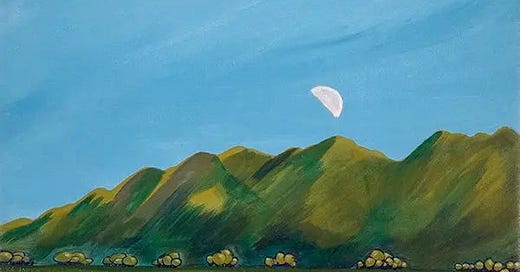
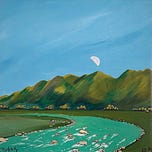


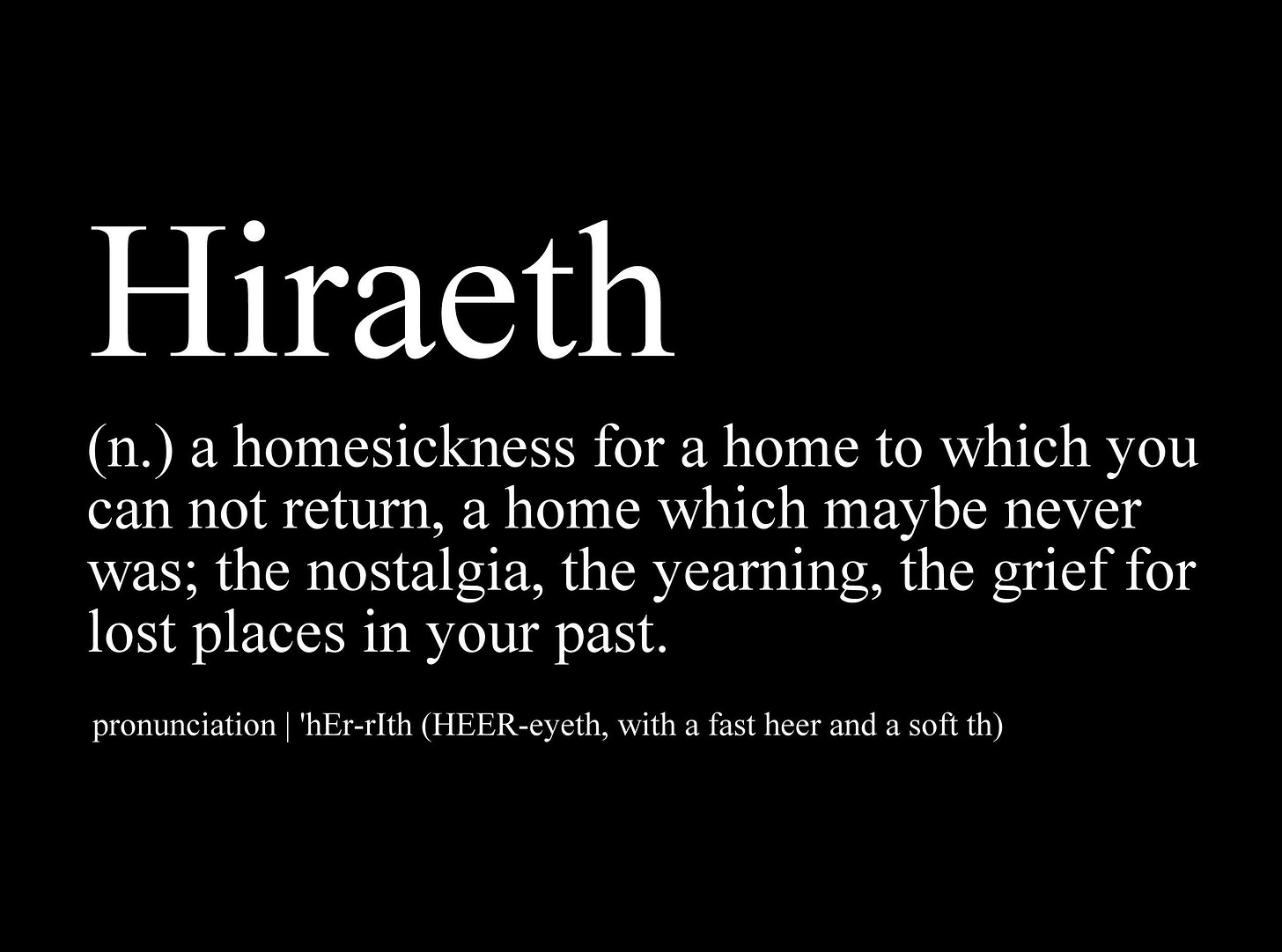
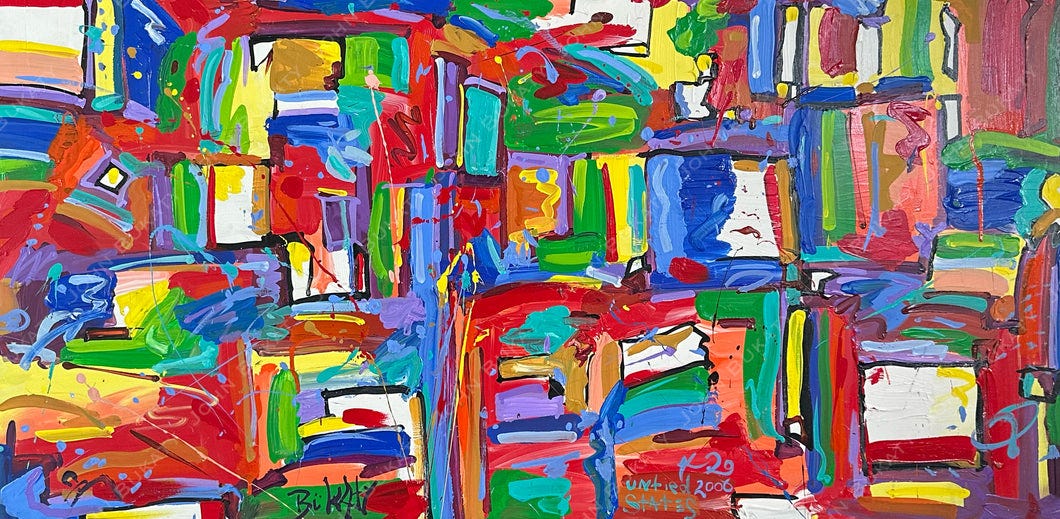

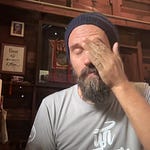

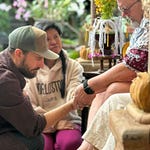
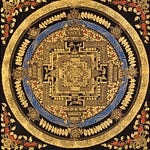
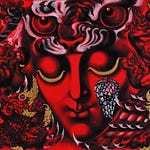

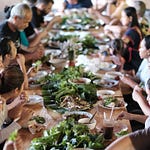
Share this post